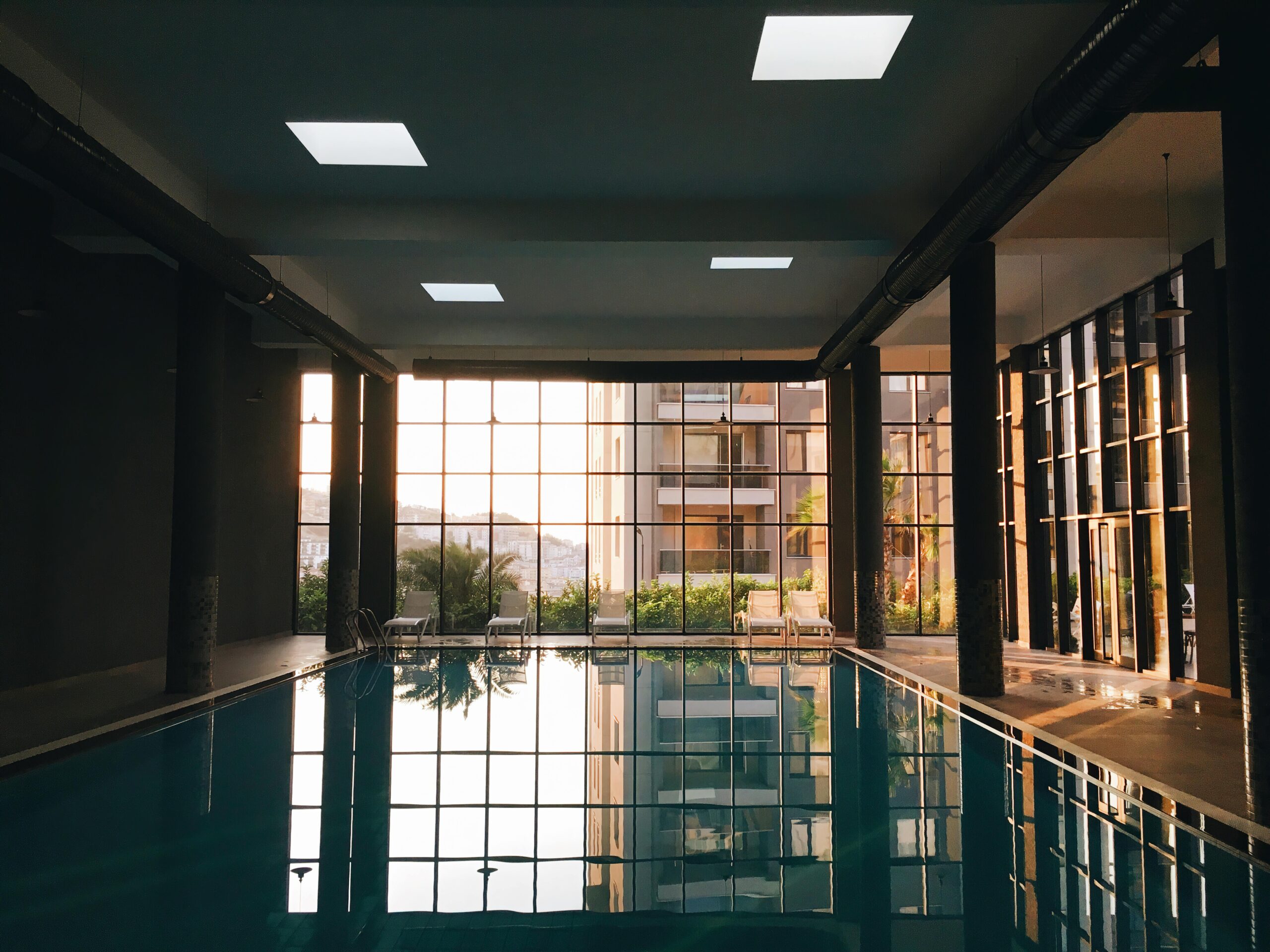Introduction – Why Indoor Swimming Pool Costs Matter
The final merger between luxury, comfort, and practicality is the indoor swimming pools. They are available year-round, regardless of the weather, unlike outside pools, where people can go swimming and exercise. Before you start digging, however, you need to realise that you will pay a lot more to construct an indoor swimming pool than an outdoor one. Construction, equipment, and climate control systems are some of the costs that may accumulate very fast. The secret to budgeting a successful project that is financially viable is to know what these costs are.

Benefits of Build an Indoor Swimming Pool
It is not just about beauty in having an indoor pool. It produces several lifestyle and health advantages:
- Seasonless fun: There are no seasonal shutdowns, rain, or snow that can make you halt swimming.
- Privacy and security: The swimming activities remain in your house with an indoor pool.
- Value of your property: A well-structured pool will add value and the market value of your house.
- Low maintenance: Indoor pools do not have to withstand the elements, in contrast to outdoor pools, because they are not exposed to leaves, dust, and weather.
Key Cost Considerations Before You Start
Not all factors in building a home are unfavourable, but these factors are some of the crucial things that every homeowner must consider before beginning the construction:
- Budget range: Building modifications and systems, such as dehumidifiers, make the costs of indoor pools much higher than those of outdoor pools.
- Space needs: You will be required to have adequate space indoors or an independent structure to accommodate the pool.
- Long-term costs: Long-term ownership may be expensive due to heating, ventilation, and frequent maintenance.

Factors That Influence How Much It Costs to Build an Indoor Swimming Pool
The ultimate cost of your indoor swimming pool is determined by a number of factors that interact. Knowing either of them will help you deal better with your budget.
Pool Size and Shape
The larger the pool, the higher the costs for excavation, materials, and water treatment systems. A typical rectangular pool costs less than a custom freeform or curved pool, which is more labour and engineering-intensive.
Materials and Finishes
The shell of the pool may be of concrete, fibreglass, or vinyl, and all come with varying prices attached. Plaster, tiles, quartz, or luxury stone are more costly by far, but the budget-friendly finish alternatives include plaster or similar materials. The aesthetics add-ons, such as the use of decorative mosaics or LED lights, are also part of the budget.
Heating, Ventilation, and Lighting Systems
Indoor pools do not just need water but a controlled environment. The heating systems make the water comfortable, and ventilation and dehumidifiers guard against excessive moisture in the building. The lighting has a functional and design purpose, whether it is a basic illumination or dramatic LEDs underwater.
Location and Labor Costs
Rates of labour are diverse as far as your place is concerned. There are high labor prices and building standards in the cities. Also, the current setup of your house might have to be changed to accommodate a pool, which is another cause of costs.
Average Cost Breakdown of Building an Indoor Swimming Pool

Although the pricing varies according to the design and location, this is a breakdown of the majority of the costs spent when constructing an indoor pool.
Construction Costs (Structure, Excavation, Installation)
This involves excavation of the pool area, the construction of the structural shell, waterproofing, and plumbing installation. Construction in itself can take 40-50 percent of the total cost.
Interior Design and Aesthetics
All these are tiles, plaster, lighting, decking, and other finishes. Such finishes as luxury or spa-like designs will soon increase the price as opposed to the simple ones.
Ongoing Maintenance and Utility Costs
Indoor pools require frequent care in the form of water treatment, cleaning and heating, and ventilation energy consumption. Anticipate electricity, chemical, and regular servicing expenses every month.
Indoor Swimming Pool Cost Comparison
Indoor vs. Outdoor Pool Costs
Indoor pools are much more costly. Outdoor pools can cost between 30,000-70,000, with indoor pools beginning at 80,000 and going up to 200,000. The extra expense is climate control, enclosures, and structural.
Budget-Friendly vs. Luxury Indoor Pools
Cost-effective pools are adherent to smaller sizes, plain finishes, and common heating. Luxury pools, in turn, can feature spas, infinity edges, custom tiles, high-tech lighting, and intelligent automation.
DIY vs. Professional Installation
There are also pool kits that allow for partial DIY engagement, which can reduce the cost of installation. But indoor pools are not easy-going, particularly ventilation and construction needs. Professional installation ensures safety, compliance, and durability.
Real-World Examples of Indoor Swimming Pool Costs
Residential Indoor Pool Case Studies
Basic heating and ventilation of a simple 12×24 ft pool may cost approximately 100,000-120,000. Sharper spa-in-large luxury pools can cost over $250 000.
Commercial and Public Indoor Pools
They are constructed much bigger and tend to cost millions based on size, recreational safety rules, and desalination capacity.
Cost-Saving Tips from Real Projects
- Choose energy-efficient heaters and dehumidifiers.
- Opt for simple rectangular designs instead of complex shapes.
- Insulate the plans to minimize the long-term energy bills.

Additional Expenses Beyond Construction
Insurance and Safety Requirements
The addition of an indoor pool increases the insurance costs of the home. Secure access, non-slip flooring, and alarms can also be requested as safety features.
Smart Technology and Automation Upgrades
Intelligent heating, lighting, and filtration controls are convenient and save energy in the long term, but increase initial expenses.
Long-Term Energy Efficiency Investments
Insulation, solar heating, and energy-efficient pumps can mean additional initial expense but will save big money on monthly bills in the long run.

FAQs
Is an indoor or outdoor pool more cost-effective to construct?
Outdoor pools are invariably cheaper. Indoor pools are more expensive due to the effect of altering building designs, climate, and structures.
So what is the costliest thing about constructing an indoor pool?
The biggest budget share is typically occupied by the structural construction and climate control systems (heating, ventilation, dehumidification).
Is it possible to create an indoor pool within a budget?
Yes, making the design simple, using standard materials, and the use of energy-efficient equipment. But even cheap indoor pools are more costly than the outdoor ones.
Conclusion
Creating a swimming pool indoors is an expensive undertaking financially, and to most household owners, the advantages will outweigh the expenditure. Whether it is year-round enjoyment and health benefits or higher property value, an indoor pool will turn a home into a personal wellness retreat.

